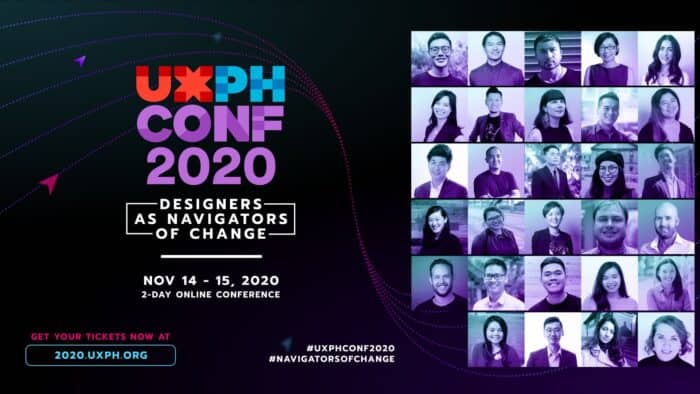Manila, Philippines – User Experience Philippines (UXPH), a local-based non-profit organization that provides connections and resources to the local design community, has recently concluded its annual conference held online on November 14 and 15.
The event was attended primarily by attendees from various sectors, ranging from UX/UI designers by profession, students, SME founders, and media practitioners.
Opened up formally by Aldrich Tan, UXPH’s managing director and CEO/co-founder of digital banking suite NextPay, Tan stated that the prime focus of the convention is to stress on the importance of collaboration and community in the design community.
“Our mission is to grow and nurture the Filipino creative community through sharing and collaboration, and raise the design standards and practices within our country; to help uplift the lives of our society. We envision an empowered culture where products and services are built mindfully and sustainably,” Tan noted.
The event was also graced with a short message from Design Center of the Philippines’ executive director Maria Rita Matute, in which she stressed the importance of designers as leaders of change.
“We as designers are called to lead the change for the better. It is time we show how we can use design and design thinking to pave the way forward, not simply towards a new normal but a better normal, a better forward, but we cannot do it as individuals [for] we are stronger together,” Matute stated.
Designers towards change and transformation
One of the prime topics being focused on in this conference is the importance of user interface and design towards change, breaking the norm, and moving towards the 21st century.
“Designers have the responsibility to share the skill that we have—this gift that we have to more people because ultimately what we, our skill as designers it’s not just to create change, it is to enable change,” Daisuke Yukita, senior interaction designer at IDEO Tokyo, a global design firm.

Yukita stressed in his talk titled “Designers as Enablers of Change”, that there are four points to note that design creates change:
- compelling content that creates emotional impact
- tangible prototypes that generates momentum
- authentic voices from users that propels decision making
- unlock the creative potential of the people that we work with
On the other hand, Lisa Gokongwei-Cheng, SVP for digital transformation and corporate services at JG Summit, stressed the importance of digital transformation amongst businesses, whether a small-medium enterprise (SME) or a traditional conglomerate company.

“[Digital] transformation is not an end state, it’s a journey. We keep iterating our operational model as we learn. In a few months, we probably will learn a few more things, or realize that some of these [are] wrong. The point is to keep pivoting,” Cheng stated in her talk titled “Lessons in Digital Transformation in a Corporate Setting.”
Accessibility and democratization: the future of UX/UI
While UX/UI have strived over the years providing accessible interfaces to many products and services both in the physical and the digital world, there is still room for improvement of such prototypes that describes both practicality and futurism.
Julian Charles Serrano, an accessibility consultant at Catalyst International, discussed keystones of web accessibility which includes usage of accessibility guidelines, accessibility training, and testing or auditing.

“When you make your content accessible, you’re going to show everybody that you took your time to understand the needs of people with disabilities, and provide them with content that they need,” Serrano stated, stressing that blind and deaf people often rely with tools such as magnifying tools and text-to-speech reader to understand online content.
On another realm, Phil Balagtas, experience design director at McKinsey Design notes that the future fares better for the UX/UI world as digital transformation strategies have helped device new services such as AI-oriented vending machines or prototypes of modern-design PPEs and face masks.

“There is no one future: there are multiple futures and multiple possibilities that could arrive. Once we are able to map out those possibilities, we could prepare for different types of scenarios. We could use these to plan out our next agenda for today.”
Other speakers of the convention came from companies like Dropbox, Tokopedia, Eskwelabs, Shopify, IBM, and scores of others.
MARKETECH APAC is an official media partner at the UXPH Conference 2020: Designers as Navigators of Change, which was held from November 14 to 15, 2020.

